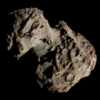105P/Singer Brewster
 | |
| Discovery | |
|---|---|
| Discovered by | Stephen Singer-Brewster |
| Discovery date | May 3, 1986 |
| Designations | |
| 1986 XI; 1992 XXVI | |
| Orbital characteristics | |
| Epoch | 2011-Feb-08 (JD 2455600.5) |
| Aphelion | 4.8915 AU |
| Perihelion | 2.0502 AU |
| Semi-major axis | 3.4709 AU |
| Eccentricity | 0.40929 |
| Orbital period | 6.47 yr |
| Inclination | 9.1706° |
| Last perihelion | 2018-Aug-10[1] February 26, 2012[2][3] September 11, 2005 April 6, 1999 |
| Next perihelion | 2025-Jan-22[1] |
105P/Singer Brewster is a periodic comet in the Solar System. It was discovered in 1986, and received the name of 1986d under the old naming system.[4]
Because 105P/Singer Brewster only comes within 2 AU of the Sun,[5] during the 2012 perihelion passage it is only expected to brighten to about apparent magnitude 17.[6]
The comet nucleus is estimated to be 2.2 kilometers in diameter.[5]
The orbit of Comet Singer Brewster was altered significantly in August 1976 when it passed within 0.376 AU of Jupiter and will be altered again in August 2059.[7][8]
The single discoverer bears a hyphenated surname (Singer-Brewster), but co-discovered comets bear the names of the co-discoverers linked by hyphens, e.g. Shoemaker-Levy 9, Swift-Tuttle, etc. In these cases, the IAU either removes one of the parts of the name or replaces the hyphen by a space.[9][10]
References
[edit]- ^ a b MPC
- ^ Seiichi Yoshida (February 19, 2011). "105P/Singer Brewster". Seiichi Yoshida's Comet Catalog. Archived from the original on April 27, 2011. Retrieved May 3, 2011.
- ^ Syuichi Nakano (April 21, 2009). "105P/Singer Brewster (NK 1762)". OAA Computing and Minor Planet Sections. Retrieved May 3, 2011.
- ^ Excerpts from the IAU circulars, May 3, 1986, in Stardust June 1986, issue 10, volume XLII, published by National Capital Astronomers
- ^ a b "JPL Small-Body Database Browser: 105P/Singer Brewster". February 5, 2011. Retrieved May 3, 2011.
- ^ "Magnitude plot for 105P/Singer Brewster in 2012". Comet for Windows. Retrieved May 3, 2011.
- ^ "C&MS: 105P/Singer Brewster". Retrieved January 13, 2012.
- ^ "JPL Close-Approach Data: 105P/Singer Brewster". February 5, 2011. Retrieved February 17, 2012.
- ^ IAU Comet-naming Guidelines, International Astronomical Union, archived from the original on March 4, 2016
- ^ Don E. Machholz (1989), "Comet Corner", Journal of the Association of Lunar and Planetary Observers, 33 (1): 25–28, 26, Bibcode:1989JALPO..33...25M,
A hyphen (-) is used in a comet's name only to separate the discoverers. Thus, when sometimes the discover has a double name, the hyphen is dropped from the comet's name in order to show that there was only one discoverer. For example, in 1986 Stephen Singer-Brewster discovered a comet. It is known as "Comet Singer Brewster."
External links
[edit]- 105P/Singer Brewster at the JPL Small-Body Database
- 105P/Singer Brewster – Seiichi Yoshida @ aerith.net
- Elements and Ephemeris for 105P/Singer Brewster – Minor Planet Center


